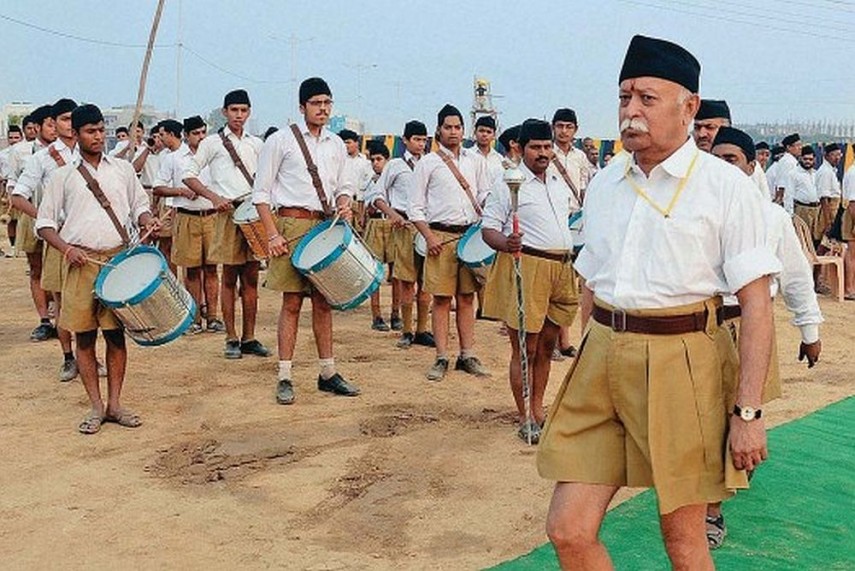In a new and rather unexpected turn of events, RSS chief Mohan Bhagwat gave a call for unity to Muslims. On Sunday, the RSS chief Mohan Bhagwat asserted that the DNA of all Indians is the same. Rashtriya Swayamsevak Sangh (RSS) chief urged Muslims not to get “trapped in the cycle of fear” that Islam is in danger in India. At an event, he said, “Do not get trapped in the cycle of fear that Islam is in danger in India.”
Also See: Arguments over Central Vista project
Bhagwat also spoke on those indulging in lynching, saying, “They are against Hindutava”. He said, “If a Hindu says that no Muslim should live here, then the person is not Hindu. Cow is a holy animal but the people who are lynching others are going against Hindutva. Law should take its own course against them without any partiality.” Bhagwat further added that at times, some false cases of lynching have been registered against people.
Bhagwat underlined that development is not possible without unity in the country. The RSS chief further stressed that the basis of unity should be nationalism and the glory of ancestors. He said that the only solution to Hindu-Muslim conflict is dialogue, not discord.
Mohan Bhagwat said, “Hindu-Muslim unity is misleading as they are not different, but one. DNA of all Indians is same, irrespective of religion.”
He further added, “We are in a democracy. There cannot be a dominance of Hindus or Muslims. There can only be the dominance of Indians.”
Also Read: A peek into by-polls in India-Can there be a way around them?
During the beginning of his speech, Mohan Bhagwat said that he was attending the event neither for any image makeover nor for vote bank politics.
Bhagwat said that neither the Sangh is in politics nor does it bother about maintaining an image. He said, “It keeps on doing its work to strengthen the nation and for the welfare of all in the society.”
The event is important given that in the coming year, UP is going to face election, where BJP’s mettle would be tested. BJP is the socio-political progeny of RSS, but not exactly family. Hence, it can be said that RSS is coming to save the face of BJP. This is especially relevant after incidents like Hathras, passing of anti-conversion law, and the failure of the centre and the UP government to tackle the second wave.
The event where Bhagwat spoke was organised by the Muslim Rashtriya Manch. The programme was on the theme ”Hindustani First, Hindustan First”. Bhagwat said that people cannot be differentiated on how they worship. Muslim Rashtriya Manch (MRM) is the Muslim wing of RSS. MRM was formed on December 24, 2002 in the presence of the then RSS chief K.S. Sudarshan to grow dialogue with Muslim community.
Also Read: UP and Punjab can pose a challenge for election commission in 2022
MRM has some head turning events to its credit. In 2018, it cut goat-shaped cakes in Lucknow on Bakrid. On the occasion of Bakrid 2018, it had called on the Muslim-community to shun extravagance and contribute in the upliftment of the poor and deprived. In 2017, it was in news for serving cow milk at Iftar in Madhya Pradesh during the Ramzan because of the “health benefits it has over beef.”
The Jamiat Ulema-e-Hind, one of the largest Islamic organisations in India had passed a resolution in November 2009 describing Vande Mataram as an un-Islamic song. Muslim Rashtriya Manch had expressed opposition to the resolution. Mohammed Afzal is one the national conveners of MRM. At that time, after the fatwa from Jamiat, he had stated, “Our Muslim brothers should not follow the fatwa as Vande Mataram is the national song of the country and every Indian citizen should respect and recite it.” The wing had further stated that Muslims who refused to sing it were opponents of both Islam and India. Prior to August 05, 2019, the organization had demanded for the scrapping for article 370 with regards to J&K. It had also criticized Farooq Abdullah on his comments and opinions about the PoK.



